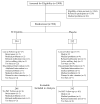High-dose B vitamin supplementation and progression of subclinical atherosclerosis: a randomized controlled trial
- PMID: 19118243
- PMCID: PMC2701290
- DOI: 10.1161/STROKEAHA.108.526798
High-dose B vitamin supplementation and progression of subclinical atherosclerosis: a randomized controlled trial
Abstract
Background and purpose: Although plasma total homocysteine (tHcy) levels are associated with cardiovascular disease, it remains unclear whether homocysteine is a cause or a marker of atherosclerotic vascular disease. We determined whether reduction of tHcy levels with B vitamin supplementation reduces subclinical atherosclerosis progression.
Methods: In this double-blind clinical trial, 506 participants 40 to 89 years of age with an initial tHcy >8.5 micromol/L without diabetes and cardiovascular disease were randomized to high-dose B vitamin supplementation (5 mg folic acid+0.4 mg vitamin B(12)+50 mg vitamin B(6)) or matching placebo for 3.1 years. Subclinical atherosclerosis progression across 3 vascular beds was assessed using high-resolution B-mode ultrasonography to measure carotid artery intima media thickness (primary outcome) and multidetector spiral CT to measure aortic and coronary artery calcium (secondary outcome).
Results: Although the overall carotid artery intima media thickness progression rate was lower with B vitamin supplementation than with placebo, statistically significant between-group differences were not found (P=0.31). However, among subjects with baseline tHcy >or=9.1 micromol/L, those randomized to B vitamin supplementation had a statistically significant lower average rate of carotid artery intima media thickness progression compared with placebo (P=0.02); among subjects with a baseline tHcy <9.1 micromol/L, there was no significant treatment effect (probability value for treatment interaction=0.02). B vitamin supplementation had no effect on progression of aortic or coronary artery calcification overall or within subgroups.
Conclusions: High-dose B vitamin supplementation significantly reduces progression of early-stage subclinical atherosclerosis (carotid artery intima media thickness) in well-nourished healthy B vitamin "replete" individuals at low risk for cardiovascular disease with a fasting tHcy >or=9.1 micromol/L.
Trial registration: ClinicalTrials.gov NCT00114400.
Comment in
-
The art of primary prevention and risk assessment: homocysteine revisited.Stroke. 2009 Mar;40(3):670-1. doi: 10.1161/STROKEAHA.108.537100. Epub 2008 Dec 31. Stroke. 2009. PMID: 19118238 No abstract available.
References
-
- Boushey CJ, Beresford SAA, Omenn GS, Motulsky AG. A quantitative assessment of plasma homocysteine as a risk factor for vascular disease. JAMA. 1995;274:1049–1057. - PubMed
-
- Refsum H, Ueland PM, Nygard O, Vollset SE. Homocysteine and cardiovascular disease. Annu Rev Med. 1998;49:31–62. - PubMed
-
- Graham IM, Daly LE, Refsum HM, Robinson K, Brattstrom LE, Ueland PM, Palma-Reis RJ, Boers GH, Sheahan RG, Israelsson B, Uiterwaal CS, Meleady R, McMaster D, Verhoef P, Witteman J, Rubba P, Bellet H, Wautrecht JC, de Valk HW, Sales Luis AC, Parrot-Rouland FM, Tan KS, Higgins I, Garcon D, Andria G. Plasma homocysteine as a risk factor for vascular disease: the European Concerted Action Project. JAMA. 1997;277:1775–1781. - PubMed
-
- Bostom AG, Jacques PF, Nadeau MR, Williams RR, Ellison RC, Selhub J. Post-methionine load hyperhomocysteinemia in persons with normal fasting total plasma homocysteine: initial results from the NHLBI Family Heart Study. Atherosclerosis. 1995;116:147–151. - PubMed
-
- Verhoef P, Kok FJ, Kruyssen DACM, Schouten EG, Witteman JCM, Grobbee DE, Ueland PM, Refsum H. Plasma total homocysteine, B vitamins, and risk of coronary atherosclerosis. Arterioscler Thromb Vasc Biol. 1997;17:989–995. - PubMed
Publication types
MeSH terms
Substances
Associated data
Grants and funding
LinkOut - more resources
Full Text Sources
Other Literature Sources
Medical


